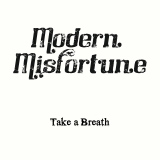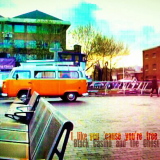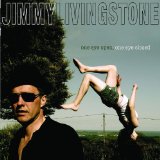I came across Jimmy Livingstone when he supported Lucinda Williams at the Brighton Festival in May and was impressed enough with the live performance to buy his CD. Then it was one man and his acoustic guitar, so I was pleasantly surprised to find the album has horns and strings (both competently arranged by Livingstone), keyboards and percussion to enhance his sound.
Jimmy has twangs of country, blues riffs and strums of folksiness to add to his essentially acoustic sound, yet his voice is almost Neil Diamond; his inspirations must therefore be pretty broad, though he never sounds derivative. The CD kicks off with “Getting By”, a good way to introduce himself and his troubadour lifestyle, but track 2, “Desert Song”, his first single is more swinging. Although he sings, “I’m crawling out of the wreckage at the bitter end of love” there are thankfully few clichés here about women or rock ‘n’ roll; he sings “I don’t need to blow my brains away, I’m not that rock ‘n’ roll”, but the track hits its stride well. The torchier “The Waiting Room” sees him waiting for love and Doggen Foster lends some authentic bluesy electric guitar at the end. Then it’s more upbeat again…
Track order is important on a recording and Jimmy has probably got it right here, although the part of me that likes my artists tortured would have liked the downbeat tracks to have been placed together. I can understand the man wanting to keep precious creative control, but I wonder if he had relinquished production altogether (credits are to JL and Eric Liljestrand) he might have been pushed to explore his depths just a little more; instead it sounds like he decided to try to keep it reasonably upbeat-sounding.
If anything, Jimmy Livingstone sometimes tries to cram too many ideas into one song and occasionally they suffer from too much verse and not enough refrain to make a song immediately memorable but, I suspect, in his creative process the lyric comes first.
“Useless Man” starts almost like the Rolling Stones with electric guitar and unique percussion and rocks with attitude; as a result his voice is stretched a little further. This track should have been the single in my opinion, as he really speaks up for himself and sounds comfortable doing so but it is less representative of the collection as a whole. “In Your Own Sweet Time” is a piano-led song of longing “I’ve gotta let you come to me, come to me, in your own sweet time, sweet sister of mine”. It reminds me of Nick Cave’s “Into My Arms” and is the best of the ballads, although it’s a little unclear if the song is written to a soul-mate or sibling.
As a bonus the physical CD, as opposed to the download, includes a lyric book, although it needn’t have as Jimmy’s diction is crystal clear. There is range here both musically and lyrically and this is an above average contribution to various genres. It’s an album that sounds like it was a long time coming and I hope that future offerings have intentions and production values that allow for further exploration of both his wandering lifestyle and his musicality because, ultimately, he does not really take risks with this, his first disc.
And an extra half star to take it up to 3.5.
The last gig in May was in a cellar bar in Edinburgh which held about a hundred people and the first one in June is The Royal Albert Hall which holds about five thousand. I’m going to be honest with you, I normally try to avoid the Albert Hall; the acoustics may be great for The Proms and orchestral music generally, but anything percussive and bottom-heavy usually sounds like a sock full of custard hitting a wall. There; I’ve said it. There may be an acoustic sweet spot, but I’ve no idea where it is and I feel sorry for any sound engineer who gets that particular gig.
Elvis Costello is one those artists who has been around so long, and written so many great songs that, like Neil Young, Bob Dylan, Bruce Springsteen and Van Morrison, he’s entitled to a bit of leeway with his live and recorded output. Just like all of those legends (maybe with the exception of The Boss), he sometimes pushes our tolerance close to the limit and tonight was no exception, but I’ll come back to that. This tour features the “Spectacular Return of the Spectacular Spinning Songbook”, where members of the audience are invited on stage to spin the giant wheel to pick a song from the extensive back catalogue or a theme that allows Elvis or a band member (Steve Nieve, Pete Thomas and Davey Faragher) to choose where the set goes next.
The first six songs were relentless, with the band playing flat out, too fast and leaving no gaps between songs. It sounded a lot like the 1978 El Mocambo official bootleg, and I think we all know that it wasn’t just youthful exuberance and adrenaline to blame on that occasion. It meant that songs like “High Fidelity” and “I Can’t Stand Up for Falling Down” were lost in a headlong rush to the first spin of the wheel. Thankfully, the interactive element of the set forced some much-needed changes of pace. From the first spin of the wheel, things became less frantic as Elvis put on his Napoleon Dynamite, Master of Ceremonies persona and introduced members of the audience aided and abetted by the mysterious Josephine and the go-go dancer Dixie de la Fontaine.
I’m not even going to attempt to give you a complete setlist for a three hour performance, but there were a lot of highlights (and a couple of lowlights), so here we go. We got “Girls Talk” (better known to most as a cover by Dave Edmunds) fairly early courtesy of the wheel, which also gave the band the chance to play a more soulful live version of “Every Day I Write the Book”. It was nice to see Elvis totally ignore the wheel’s selection to throw in “(The Angels Wanna Wear my) Red Shoes” because one of the audience spinners wanted to hear it. The “Cash” segment of the wheel also gave us the obvious Johnny Cash cover, but also a Rosanne Cash song, which is always going to be fine by me. There was also a cameo appearance by the wonderful Bonnie Raitt who, unfortunately, didn’t sing or play but did come along to say hello and be serenaded by Elvis.
A spin of the wheel also gave Steve Nieve the chance to deliver his stunning piano backing on one of my favourite Elvis songs, “Shot With his Own Gun”, which opens with the line “How does it feel now you’ve been undressed by a man with a mind like the gutter press”. As always, this song was made more powerful by the stripped-down backing which also gave a contrast to the first verse of “Oliver’s Army” before the full band kicked in for the rest of the song.
“Jimmie Standing in the Rain” was a perfect fit with the vaudevillian atmosphere of the performance, which you almost expected to lead in to “God’s Comic”, but it was another song from “Spike” which grabbed the attention. “Tramp the Dirt Down” was an angry song, and rightly so, when it was released in 1989, less than two years before Margaret Thatcher was deposed by her party, but I’m puzzled by the need to play it now apart from the obvious unthinking kneejerk reaction it received; bit of a cheap shot, really. If you want to score political points, the haunting live version of “Shipbuilding” stands the test of time much better and should be the one that demonstrates a commitment to something more than just pop songs.
The encores were a return to the hundred mph enthusiasm of the opening section, but with the audience fully behind the band at last as they delivered runaway versions of “Watching the Detectives”, “Pump it Up” and, ironically for this location, “(I Don’t Want to go to) Chelsea”. Just before I get to the main highlight, I’ve got a few observations. The dynamics of the show, particularly at the beginning, could have been better; the endings of the songs could have been less overblown; and, Elvis could have turned the wick down on the guitar solos. At times he strayed into Neil Young territory and that’s a dangerous place to be unless you’re Neil Young (even then it’s hit and miss).
Maybe I’m just being too picky. The Elvis back catalogue contains some stunning songs and even a three hour set means missing out on some favourites; I would have loved to hear “Alison”, “Green Shirts” and “Good Year for the Roses”, but I got to hear “Shot with his Own Gun”, which I really didn’t expect. The last song of the night was Nick Lowe’s “(What’s So Funny ‘Bout) Peace Love and Understanding”, which made my night anyway, but there was still a surprise to come. Steve Nieve dashed off stage and followed a crew member upstairs as the rest of the band played on. Seconds later, the band was augmented by the thunderous sounds of the Royal Albert Hall pipe organ as one of pop and rock’s greatest keyboard players had the chance to finish off the set in a unique way; I certainly won’t forget it.
I had a few reservations but, as a spectacle, (no pun intended) this was wonderful; loads of great songs, great performances and audience involvement. I’d go back and do it again.
 It’s a bit of a contrast with the last gig I reviewed. That was in a shiny new purpose-built venue in London and this is in Henry’s Cellar Bar in Edinburgh which has a capacity of about a hundred if everyone breathes in at the same time. This was a flying visit to have a look at Modern Misfortune, an Edinburgh/Glasgow-based band comprising Amber Milne (vocals), Andrew Mortimer (guitar), Adam Wier (bass), Euan Thompson (guitar and vocal) and our own Edinburgh correspondent Louie Anderson (drums).
It’s a bit of a contrast with the last gig I reviewed. That was in a shiny new purpose-built venue in London and this is in Henry’s Cellar Bar in Edinburgh which has a capacity of about a hundred if everyone breathes in at the same time. This was a flying visit to have a look at Modern Misfortune, an Edinburgh/Glasgow-based band comprising Amber Milne (vocals), Andrew Mortimer (guitar), Adam Wier (bass), Euan Thompson (guitar and vocal) and our own Edinburgh correspondent Louie Anderson (drums).
Although this was a whistle-stop visit to see Modern Misfortune, I have to say something about The Phlegm after hearing the second half of their set. Most of what I heard was passable psychobilly (including a cover of “Blue Suede Shoes”), but the set closer was a storming surfpunk version of the Surfaris’ 1963 instrumental “Wipeout” which got the crowd dancing, smiling or both.
It was a difficult act to follow, but Modern Misfortune opened with their live favourite “Disheartened” and grabbed the audience from the start of the set. Playing spiky, punky guitar-based pop with female vocals invites comparisons with late seventies punk legends The Rezillos, and that’s pretty close to the mark with some of the material. The band play the originals “Cry Witch” and “Zugzwang Detente” from their current EP/mini album plus “How to Lie”, “Nothing Left to Receive” and “B Young” and 1 seventies cover. The original material is strong and delivered convincingly although not without a few problems. Playing at this level, monitor mix is always going to be difficult and the lead and backing vocals seemed to struggle to stay in tune at times.
The seventies cover showed Modern Misfortune at their very best as they tackled the Buzzcocks’ “Ever Fallen in Love…” with tremendous energy as a straight copy initially before sliding into a Hendrix/Pink Floyd-inspired breakdown and back into the song structure again for the ending. It got the crowd moving, particularly the ones who loved it first time round (me included), and left them in the right mood for the final song.
There was a lot to like in this live performance, particularly the strength of the songs and the way bass, drums and lead guitar worked together. The lead and backing vocals were a bit ragged at times (which, to be air, I’ve heard from bands that have played together for years) and using two guitars felt a little over the top at times. There’s definitely musical talent there and if it doesn’t break through in the guise of Modern Misfortune, it’s going to break through somewhere else.
 Following on from their debut EP “Falling into pieces” in 2011, this free download is the first release from Black Casino & the Ghost’s first album “Some Dogs Think their Name is No”, scheduled for release in September 2013 on Lucky Machete Records. Black Casino and the Ghost are Elisa Zoot (vocals and piano), Ariel Lerner (guitar), Gary Kilminster (bass) and Paul Winter-Hart (drums) and their songs are guitar-based indie/alternative which explore the darker, stranger side of human emotions and, in this case, alienation and a dysfunctional relationship.
Following on from their debut EP “Falling into pieces” in 2011, this free download is the first release from Black Casino & the Ghost’s first album “Some Dogs Think their Name is No”, scheduled for release in September 2013 on Lucky Machete Records. Black Casino and the Ghost are Elisa Zoot (vocals and piano), Ariel Lerner (guitar), Gary Kilminster (bass) and Paul Winter-Hart (drums) and their songs are guitar-based indie/alternative which explore the darker, stranger side of human emotions and, in this case, alienation and a dysfunctional relationship.
It’s a song of two halves and packs in a lot of ideas in just over three minutes. The song begins with just Elisa’s voice and piano (and a little bit of guitar in the background) setting the lyrical scene for the song before the drums and bass come in at the halfway point and Elisa’s vocal moves up from breathy and intimate to powerful and punchy enough to cut through an anthemic kitchen-sink production of massed choral vocals and reversed instrumental samples peaking with the refrain “All we are is what we choose to hide from each other, tell me how you really feel or don’t even bother”.
This single demonstrates the dynamic range of Black Casino & the Ghost instrumentally, but particularly the vocal range of Elisa Zoot, which is exceptional. I’ve heard some of the tracks from the album and I’m not sure that this is completely representative of the band’s work, but it’s still very good and you can download it free, so why wouldn’t you?
Welcome to WordPress. This is your first post. Edit or delete it, then start blogging!




